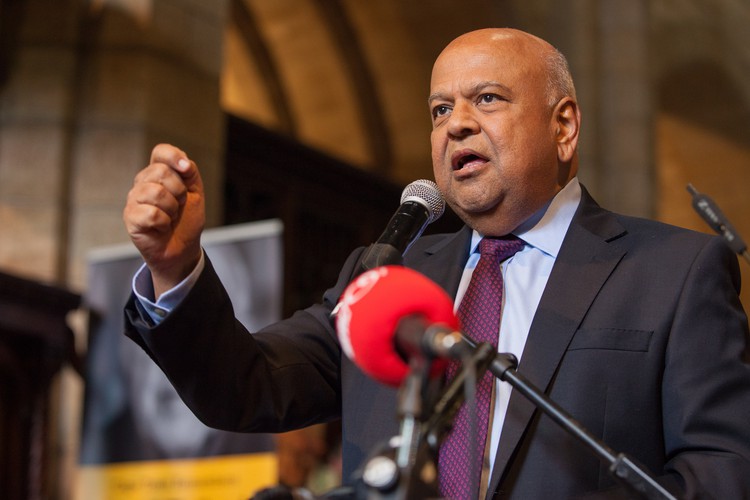
13 September 2024
Pravin Gordhan addressing the audience at Ahmed Kathrada’s memorial in St Georges Cathedral in Cape Town in 2017. Archive photo: Ashraf Hendricks.
In 2020 Jonathan Ancer and I were commissioned to co-author a biography of Pravin Gordhan. We were both intrigued by the man – probably known best at the time for his resistance to former president Jacob Zuma’s state capture project – and started our research. It took us on a remarkable and affirming journey.
We both came from journalist backgrounds and shared a fairly jaundiced view of public representatives. Both of our previous, separate efforts at authoring books had centred on pretty unsavoury characters – in Jonathan’s case an apartheid spy and mine an unscrupulous businessman – and we expected Gordhan to at least have some skeletons rattling around somewhere, or maybe feet of clay.
So we nagged his personal assistants in the public enterprises ministry until one day he popped up on our screens for a zoom interview which he began with the question: “Okay, what’s your first question?”
In the months that followed we spent several hours with him doing interviews. During them, he sketched out his extraordinary life from student activist in Durban in the 1970s, to an underground activist for the ANC (when he was brutally tortured by the apartheid Security Branch), to an important and influential player in the multi-party negotiations that gave rise to a democratic South Africa, to turning the SA Revenue Service (SARS) into a world-class organisation, and to becoming a cabinet minister. It was, of course, in this latter guise – in one of his two stints as finance minister – that Gordhan clashed with Zuma as he moved to block various state capture initiatives.
During those interviews Gordhan never once refused to answer a question or tried to influence what we would write. His openness and apparent honesty were quite exceptional.
We also interviewed many other people who were either former comrades or had worked alongside him in government.
Some of them pointed to what might be described as negative character traits: he was extremely demanding of his staff; he did not suffer fools gladly; he could be irascible and impatient.
But for every one of these there were scores of positive comments. Several of the people who knew him well said he was incorruptible. Some said he was a master strategist, while others remarked on his moral courage and that he would always do the “right thing”, whether it be standing up against apartheid or against the corrupt tendencies of some of his latter-day colleagues.
And what, we wondered, drove this behaviour? Perhaps the answer is best provided by the concept of a “higher purpose” which he used at SARS. The higher purpose, he would tell his staff, was to gather enough tax money to provide, say, schools or decent hospitals for those who had previously been denied them. In other words, Gordhan was driven by serving the people of South Africa.
This, and the fact that SARS was taking on criminal networks, made him unpopular in the corrupt circles which were flourishing at the time. He became the subject of an intense smear campaign that appears to have been driven by the intelligence community but also ultimately involved many others, some unwittingly, such as journalists from the Sunday Times who wrote a series of damning but now discredited articles.
We had decided not to venture into his private life so have no idea about that, but the overwhelming conclusion we reached was that we had uncovered that rare beast – an honest politician.
There had been a lot of smoke around him and we expected to find fire, but we didn’t. Instead, as we wrote at the time, “we found somebody who’s devoted his entire life to the service of this country and whose primary motivation seems to be simply to make it a better place for all of us”.
The one passage of his career that is now open to question is his stewardship of the public enterprises ministry, where he was charged with addressing the shortcomings of the state-owned enterprises (such as Eskom, SAA, Transnet and Denel). Our research and writing was done relatively early in his time as minister of that portfolio, but we were left with the impression that he had a plan and would turn them around in spite of the fact that they had been central to the state capture project and were all terribly hollowed-out.
A close confidante of Gordhan’s told us at the time that the challenge was made all the more difficult by two factors: the extent of the corruption inside these organisations, which was considerably greater than Gordhan and his lieutenants had anticipated; and the divisions in the ANC at the time, where those associated with state capture or loyal to Zuma would move to undermine Gordhan’s work at every turn.
Whatever the case, it is probably fair to suggest that he retired from the job earlier this year with unfinished business.
During our interviews Gordhan had suggested he would continue serving the ANC – to which he was still fiercely loyal – for as long as it needed him. His retirement came, therefore, as a surprise. Perhaps he was already struggling with his health or maybe the many years of battle had finally worn him down.
Whatever the case, his contribution to South Africa has been immense, both as an anti-apartheid activist and in government. And he deserves to be remembered as that: an extraordinary and courageous person who served the people of this country with great distinction and made a real difference to their lives.